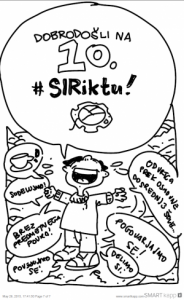Lidija Grubelnik, Osnovna šola Sladki Vrh
In the article we want to present the importance of learning in the nature, outside the classrooms and curriculum. At the primary school Sladki Vrh we are carrying out for over a decade a three-day camp for the gifted students. The main purpose of the camps is to broaden and deepen their lifelong skills and to exceed the goals of the curriculum no matter the prior knowledge. The students gain the knowledge independently in heterogeneous groups under the teachers’ supervision. The emphasis is on the collaborative learning. The camps are carried out outside the school environment, in CŠOD (Centre for School Activities), where only the accommodation is offered while activities are performed by students and their mentors. The students can therefore choose their own working and creative area and are not so time limited like at school. The workshops are prepared by the teachers where every year we try to find the common or leading topic of the camp to include most of the school subjects and fields. We wish to emphasise one of the main topics of the camps, golden ratio. The students were challenged to recognize as many as possible geometric shapes in one of the most famous logotype in the world and find the laws of nature between the written numbers in the logotype. This led the students to the golden ratio and Fibonacci sequence. Mathematical laws of nature helped the students at art, which led them to one of the greatest scientist and artist, Leonardo da Vinci. The actual example showed how a certain topic can be discussed through several fields such as science as well as sociology. The main task of the teachers is to stress out the link of different knowledge and learning from the nature. The students were individually revealing the laws of nature of the golden ratio on the field. With the help of camera and ICT they uploaded the photos on the computer and with measuring and drawing they were studying the laws of nature of the golden ratio from the photos taken on the field. The students are excited over such methods and work. They need to be challenged and given the opportunity to independently plan the learning process and be able to explore in the nature. With such work they unknowingly broaden their knowledge just with observing the nature and by the same time we do not want to achieve only conceptual and procedural knowledge. Knowledge that lasts can be achieved only with mathematical problems while ICT enables the students faster and more quality fulfilment of set goals. However, we are aware that it is difficult to offer the students such way of learning on daily basis.
